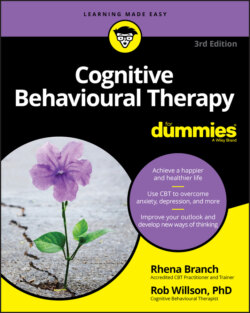Читать книгу Cognitive Behavioural Therapy For Dummies - Rob Willson - Страница 14
Combining science, philosophy and behaviour
ОглавлениеCBT is a powerful treatment because it combines scientific, philosophical and behavioural aspects into one comprehensive approach to understanding and overcoming common psychological problems.
Getting scientific. CBT is scientific not only in the sense that it has been tested and developed through numerous scientific studies but also in the sense that it encourages clients to become more like scientists. For example, during CBT, you may develop the ability to treat your thoughts as theories and hunches about reality to be tested (what scientists call hypotheses) rather than as facts.
Getting philosophical. CBT recognises that people hold values and beliefs about themselves, the world and other people. One of the aims of CBT is to help people develop flexible, non-extreme and self-helping beliefs that help them adapt to reality and pursue their goals. Your problems are not all just in your mind. Although CBT places great emphasis on thoughts and behaviour as powerful areas to target for change and development, it also places your thoughts and behaviours within a context. CBT recognises that you’re influenced by what’s going on around you and that your environment makes a contribution towards the way you think, feel and act. However, CBT maintains that you can make a difference to the way you feel by changing unhelpful ways of thinking and behaving – even if you can’t change your environment. Incidentally, your environment in the context of CBT includes other people and the way they behave towards you. Your living situation, your culture, workplace dynamics or financial concerns are also features of your larger environment.
Getting active. As the name suggests, CBT also strongly emphasises behaviour. Many CBT techniques involve changing the way you think and feel by modifying the way you behave. Examples include gradually becoming more active if you’re depressed and lethargic, or facing your fears step by step if you’re anxious. CBT also places emphasis on where you focus your attention. Mental behaviours, such as worrying and chewing over negative events, can be helped by learning to focus your attention in a more helpful direction.
